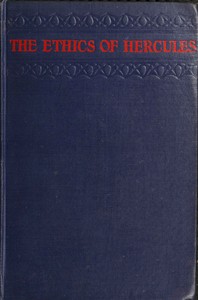The ethics of Hercules : A study of man's body as the sole determinant of…
"The Ethics of Hercules" by Robert Chenault Givler is a philosophical treatise written in the early 20th century. The work explores the relationship between human physiology and ethics, arguing that the understanding of ethical values is contingent upon the mechanics of the human body. Givler posits that ethical values arise from bodily functions and actions, positioning the study of ethics as an empirical science rooted in human biology. At the start of
the book, Givler outlines his intention to establish a mechanistic approach to ethics that challenges traditional views. He emphasizes that ethical problems are inherently human problems, to be examined through the lens of physiological mechanisms rather than abstract ideals. Givler draws a distinction between the figure of Hercules, representing strength and perseverance in facing ethical challenges, and entities like Cinderella, embodying a passive and escapist approach to life. He expresses a commitment to revealing fundamental truths in ethical thought, which he believes have been obscured by longstanding metaphysical and moral traditions. The author asserts that natural science can illuminate our understanding of ethics, inviting readers to reconsider their preconceived notions about the nature of good and evil. (This is an automatically generated summary.)
Read or download for free
| How to read | Url | Size | |||
|---|---|---|---|---|---|
| Read now! | https://www.gutenberg.org/ebooks/70666.html.images | 383 kB | |||
| EPUB3 (E-readers incl. Send-to-Kindle) | https://www.gutenberg.org/ebooks/70666.epub3.images | 474 kB | |||
| EPUB (older E-readers) | https://www.gutenberg.org/ebooks/70666.epub.images | 472 kB | |||
| EPUB (no images, older E-readers) | https://www.gutenberg.org/ebooks/70666.epub.noimages | 365 kB | |||
| Kindle | https://www.gutenberg.org/ebooks/70666.kf8.images | 1.3 MB | |||
| older Kindles | https://www.gutenberg.org/ebooks/70666.kindle.images | 1.2 MB | |||
| Plain Text UTF-8 | https://www.gutenberg.org/ebooks/70666.txt.utf-8 | 326 kB | |||
| Download HTML (zip) | https://www.gutenberg.org/cache/epub/70666/pg70666-h.zip | 731 kB | |||
| There may be more files related to this item. | |||||
Similar Books
About this eBook
| Author | Givler, Robert Chenault, 1884-1975 |
|---|---|
| LoC No. | 24007328 |
| Title | The ethics of Hercules : A study of man's body as the sole determinant of ethical values |
| Original Publication | United States: Alfred A. Knopf, 1924. |
| Credits | Bob Taylor, Tim Lindell and the Online Distributed Proofreading Team at www.pgdp.net (This file was produced from images generously made available by The Internet Archive/American Libraries.) |
| Reading Level | Reading ease score: 54.4 (10th to 12th grade). Somewhat difficult to read. |
| Language | English |
| LoC Class | BJ: Philosophy, Psychology, Religion: Ethics, Social usages, Etiquette, Religion |
| Subject | Ethics |
| Subject | Psychophysiology |
| Category | Text |
| EBook-No. | 70666 |
| Release Date | Apr 29, 2023 |
| Copyright Status | Public domain in the USA. |
| Downloads | 293 downloads in the last 30 days. |
| Project Gutenberg eBooks are always free! | |

